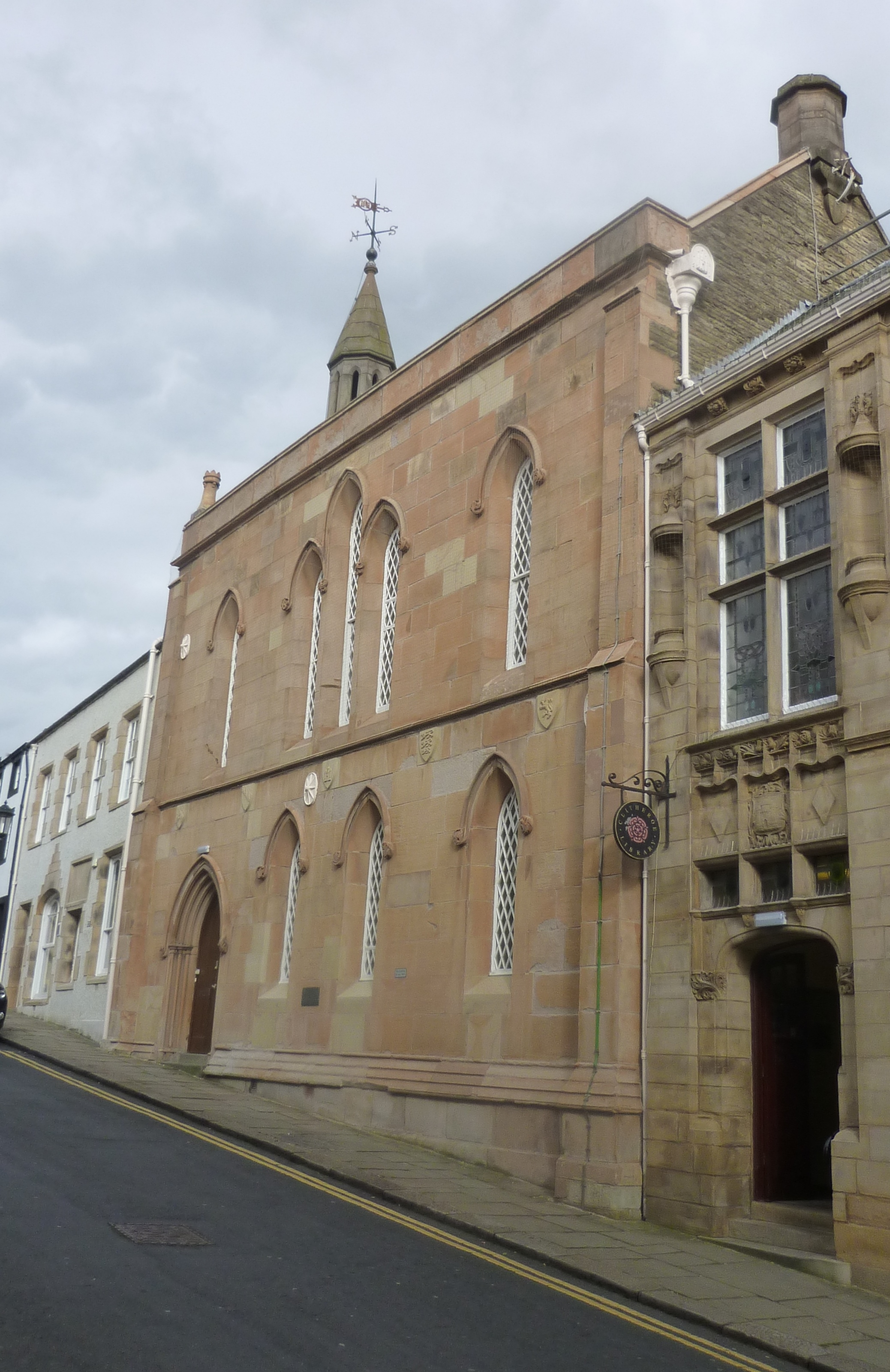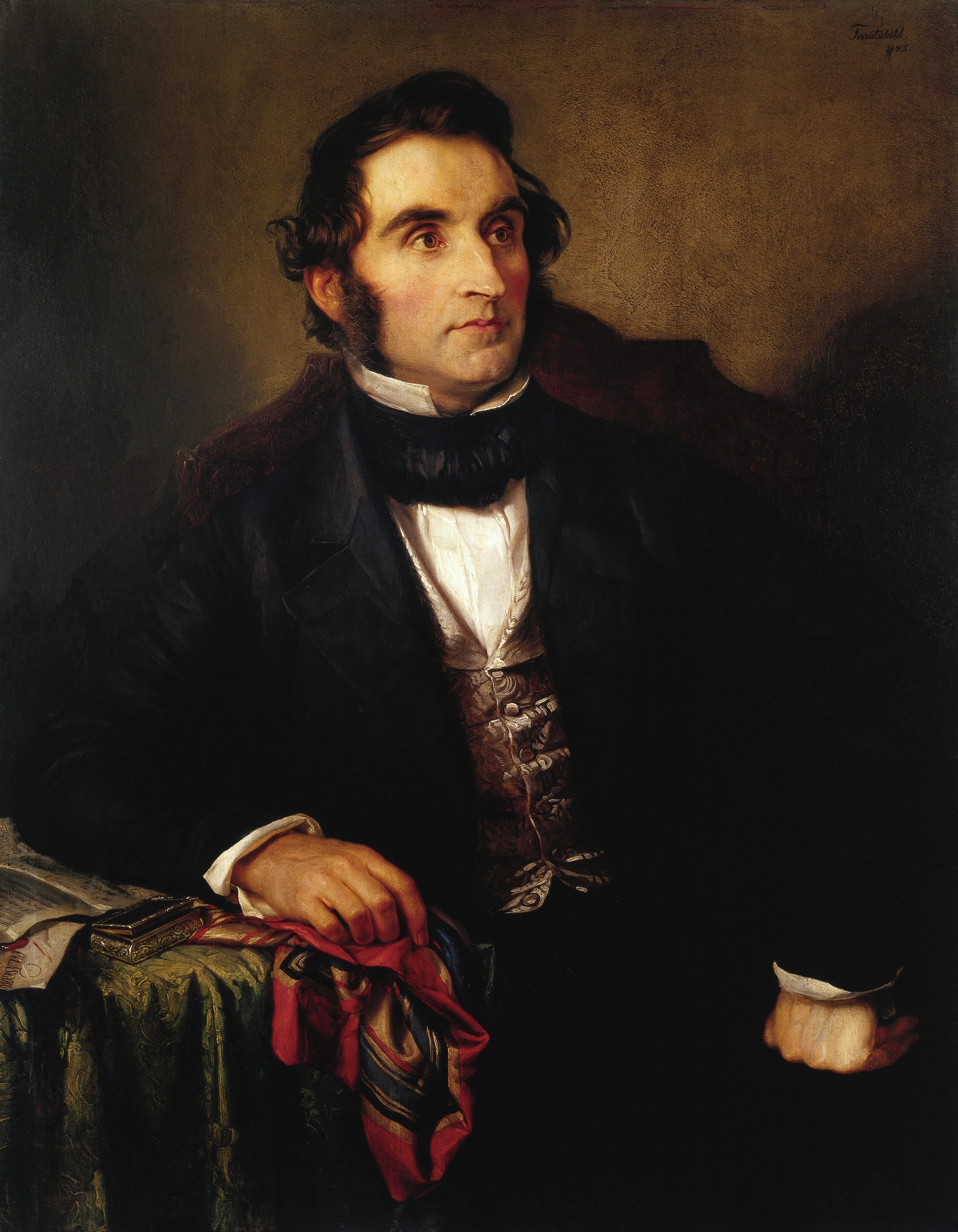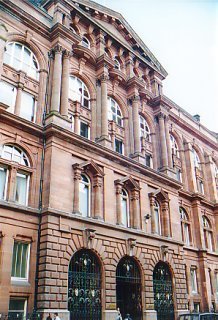|
Lyon Playfair, 1st Baron Playfair
Lyon Playfair, 1st Baron Playfair (1 May 1818 – 29 May 1898) was a British scientist and Liberal politician who was Postmaster-General from 1873 to 1874. Early life Playfair was born at Chunar, Bengal, the son of George Playfair (1782-1846), the chief inspector-general of hospitals in that region, and Janet Ross (1795-1862), daughter of John Ross. The family was fairly middle class with strong academic roots in University of St Andrews, his grandfather being Rev Prof James Playfair, Principal of the University of St Andrews. All of Playfair's siblings were sent back to Scotland to avoid the hazards of an Indian upbringing. Playfair was named after his uncle, Sir Hugh Lyon Playfair, and was educated at the University of St Andrews, the Andersonian Institute in Glasgow, and the University of Edinburgh. After going to Calcutta at the end of 1837, he became private laboratory assistant to Thomas Graham at University College, London, and in 1839 went to work under Justus Liebig ... [...More Info...] [...Related Items...] OR: [Wikipedia] [Google] [Baidu] |
The Right Honourable
''The Right Honourable'' ( abbreviation: ''Rt Hon.'' or variations) is an honorific style traditionally applied to certain persons and collective bodies in the United Kingdom, the former British Empire and the Commonwealth of Nations. The term is predominantly used today as a style associated with the holding of certain senior public offices in the United Kingdom, Canada, New Zealand, and to a lesser extent, Australia. ''Right'' in this context is an adverb meaning 'very' or 'fully'. Grammatically, ''The Right Honourable'' is an adjectival phrase which gives information about a person. As such, it is not considered correct to apply it in direct address, nor to use it on its own as a title in place of a name; but rather it is used in the third person along with a name or noun to be modified. ''Right'' may be abbreviated to ''Rt'', and ''Honourable'' to ''Hon.'', or both. ''The'' is sometimes dropped in written abbreviated form, but is always pronounced. Countries with common or ... [...More Info...] [...Related Items...] OR: [Wikipedia] [Google] [Baidu] |
University Of Edinburgh
The University of Edinburgh ( sco, University o Edinburgh, gd, Oilthigh Dhùn Èideann; abbreviated as ''Edin.'' in post-nominals) is a public research university based in Edinburgh, Scotland. Granted a royal charter by King James VI in 1582 and officially opened in 1583, it is one of Scotland's four ancient universities and the sixth-oldest university in continuous operation in the English-speaking world. The university played an important role in Edinburgh becoming a chief intellectual centre during the Scottish Enlightenment and contributed to the city being nicknamed the " Athens of the North." Edinburgh is ranked among the top universities in the United Kingdom and the world. Edinburgh is a member of several associations of research-intensive universities, including the Coimbra Group, League of European Research Universities, Russell Group, Una Europa, and Universitas 21. In the fiscal year ending 31 July 2021, it had a total income of £1.176 billion, of ... [...More Info...] [...Related Items...] OR: [Wikipedia] [Google] [Baidu] |
Clitheroe
Clitheroe () is a town and civil parish in the Borough of Ribble Valley, Lancashire, England; it is located north-west of Manchester. It is near the Forest of Bowland and is often used as a base for tourists visiting the area. In 2018, the Clitheroe built-up area had an estimated population of 16,279. The town's most notable building is Clitheroe Castle, which is said to be one of the smallest Norman keeps in Great Britain. Several manufacturing companies have sites here, including Dugdale Nutrition, Hanson Cement, Johnson Matthey and Tarmac. History The name ''Clitheroe'' is thought to come from the Anglo-Saxon for "Rocky Hill", and was also spelled ''Clyderhow'' and ''Cletherwoode'', amongst others. The town was the administrative centre for the lands of the Honour of Clitheroe. The Battle of Clitheroe was fought in 1138 during the Anarchy. These lands were held by Roger de Poitou, who passed them to the De Lacy family, from whom they passed by marriage in 1310 or 1311 to ... [...More Info...] [...Related Items...] OR: [Wikipedia] [Google] [Baidu] |
University Of Giessen
University of Giessen, official name Justus Liebig University Giessen (german: Justus-Liebig-Universität Gießen), is a large public research university in Giessen, Hesse, Germany. It is named after its most famous faculty member, Justus von Liebig, the founder of modern agricultural chemistry and inventor of artificial fertiliser. It covers the areas of arts/humanities, business, dentistry, economics, law, medicine, science, social sciences, and veterinary medicine. Its university hospital, which has two sites, Giessen and Marburg (the latter of which is the teaching hospital of the University of Marburg), is the only private university hospital in Germany. History The University of Giessen is among the oldest institutions of higher educations in the German-speaking world. It was founded in 1607 as a Lutheran university in the city of Giessen in Hesse-Darmstadt because the all-Hessian ''Landesuniversität'' (the nearby University of Marburg (''Philipps-Universität Marburg'') ... [...More Info...] [...Related Items...] OR: [Wikipedia] [Google] [Baidu] |
Justus Liebig
Justus Freiherr von Liebig (12 May 1803 – 20 April 1873) was a German scientist who made major contributions to agricultural and biological chemistry, and is considered one of the principal founders of organic chemistry. As a professor at the University of Giessen, he devised the modern laboratory-oriented teaching method, and for such innovations, he is regarded as one of the greatest chemistry teachers of all time. He has been described as the "father of the fertilizer industry" for his emphasis on nitrogen and trace minerals as essential plant nutrients, and his formulation of the law of the minimum, which described how plant growth relied on the scarcest nutrient resource, rather than the total amount of resources available. He also developed a manufacturing process for beef extracts, and with his consent a company, called Liebig Extract of Meat Company, was founded to exploit the concept; it later introduced the Oxo brand beef bouillon cube. He popularized an earlier in ... [...More Info...] [...Related Items...] OR: [Wikipedia] [Google] [Baidu] |
University College, London
, mottoeng = Let all come who by merit deserve the most reward , established = , type = Public research university , endowment = £143 million (2020) , budget = £1.544 billion (2019/20) , chancellor = Anne, Princess Royal(as Chancellor of the University of London) , provost = Michael Spence , head_label = Chair of the council , head = Victor L. L. Chu , free_label = Visitor , free = Sir Geoffrey Vos , academic_staff = 9,100 (2020/21) , administrative_staff = 5,855 (2020/21) , students = () , undergrad = () , postgrad = () , coordinates = , campus = Urban , city = London, England , affiliations = , colours = Purple and blue celeste , nickname ... [...More Info...] [...Related Items...] OR: [Wikipedia] [Google] [Baidu] |
Thomas Graham (chemist)
Thomas Graham (21 December 1805 – 16 September 1869) was a British chemist known for his pioneering work in dialysis and the diffusion of gases. He is regarded as one of the founders of colloid chemistry. Life Graham was born in Glasgow, and educated at the High School of Glasgow. Graham's father was a successful textile manufacturer, and wanted his son to enter into the Church of Scotland. Instead, defying his father's wishes, Graham became a student at the University of Glasgow in 1819. There he developed a strong interest in chemistry, studying under Professor Thomas Thomson, who was impressed and influenced by the young man. He left the University after receiving his MA in 1824. He later studied medicine at the University of Edinburgh and then briefly taught chemistry at the Glasgow University Portland Street Medical School. In 1828 he was elected an Honorary Fellow of the Royal Society of Edinburgh, his proposer was Edward Turner. He won the Society's Keith Medal for ... [...More Info...] [...Related Items...] OR: [Wikipedia] [Google] [Baidu] |
Calcutta
Kolkata (, or , ; also known as Calcutta , List of renamed places in India#West Bengal, the official name until 2001) is the Capital city, capital of the Indian States and union territories of India, state of West Bengal, on the eastern bank of the Hooghly River west of the border with Bangladesh. It is the primary business, commercial, and financial hub of East India, Eastern India and the main port of communication for North-East India. According to the 2011 Indian census, Kolkata is the List of cities in India by population, seventh-most populous city in India, with a population of 45 lakh (4.5 million) residents within the city limits, and a population of over 1.41 crore (14.1 million) residents in the Kolkata metropolitan area, Kolkata Metropolitan Area. It is the List of metropolitan areas in India, third-most populous metropolitan area in India. In 2021, the Kolkata metropolitan area crossed 1.5 crore (15 million) registered voters. The ... [...More Info...] [...Related Items...] OR: [Wikipedia] [Google] [Baidu] |
Andersonian Institute
The University of Strathclyde ( gd, Oilthigh Shrath Chluaidh) is a public research university located in Glasgow, Scotland. Founded in 1796 as the Andersonian Institute, it is Glasgow's second-oldest university, having received its royal charter in 1964 as the first technological university in the United Kingdom. Taking its name from the historic Kingdom of Strathclyde, it is Scotland's third-largest university by number of students, with students and staff from over 100 countries. The institution was named University of the Year 2012 by Times Higher Education and again in 2019, becoming the first university to receive this award twice. The annual income of the institution for 2019–20 was £334.8 million of which £81.2 million was from research grants and contracts, with an expenditure of £298.8 million.. History The university was founded in 1796 through the will of John Anderson, professor of Natural Philosophy at the University of Glasgow, who left i ... [...More Info...] [...Related Items...] OR: [Wikipedia] [Google] [Baidu] |
Sir Hugh Lyon Playfair
Sir Hugh Lyon Playfair (20 February 1787 – 19 January 1861) was a Scottish politician, army officer and photographic pioneer. He was Provost of St Andrews from 1842 until his death in 1861. Biography He was born in Meigle in Perthshire the third son of Margaret Lyon and the Reverend James Playfair. He was educated at Dundee Grammar School.Dictionary of National Biography: Hugh Lyon Playfair His later education was at the University of St Andrews. In 1804 he was commissioned in into the Bengal Horse Artillery. After his commission he was sent to the University of Edinburgh for three months for instruction in range-finding and ballistics. He served in India from 1805 to 1817 and from 1820 to 1834. He was initially based in Calcutta but in November 1806 had to undertake an 800-mile march with his brigade to Cawnpore. In March 1807 General Sir John Horsford placed him in charge of the troops at Bareilly and was required to suppress the robber-chief Tumon Singh in Oudh. In N ... [...More Info...] [...Related Items...] OR: [Wikipedia] [Google] [Baidu] |
Principal Of The University Of St Andrews
The Principal of the University of St Andrews is the chief executive and chief academic of the University. The Principal is responsible for the overall running of the university, presiding over the main academic body of the university, known as the '' Senatus Academicus'' (Academic Senate). The Senate has the responsibility for superintending and regulating teaching in the University, including the regulations for the conferring of degrees, and the Senate also administers the property and revenues of the University (subject to the authority of the University Court.) The Principal is appointed by the University Court. The current office of Principal dates to 1858 with the passage of the Universities (Scotland) Act 1858. The Principal is, by convention, appointed as Vice-Chancellor of the University of St Andrews by the Chancellor, and can confer degrees in the absence of the Chancellor. As of April 2017, the Principal was Professor Sally Mapstone, who had previously served as Pro-V ... [...More Info...] [...Related Items...] OR: [Wikipedia] [Google] [Baidu] |
James Playfair (minister)
James Octavius Playfair FRSE (1736–1819) was a Scottish minister, academic and author and a figure in the Scottish Enlightenment. Life He was born on 7 December 1736 at Knowhead of Bendochy (a farm) in Perthshire the son of George Playfair (d. 1786), a farmer, and his wife, Jean Roger (d. 1804). He studied at St Andrews University and then was ordained as minister of Newtyle (1770–77) and then translated to Meigle (1777–1800). He was then appointed Principal of St Andrews University in 1800. During this period he was also minister of St Leonard's Church in St Andrews. In 1779 St Andrews awarded him an honorary doctorate (DD). In 1787 he was elected a Fellow of the Royal Society of Edinburgh. His proposers were John Playfair (a distant cousin) and Alexander Fraser Tytler. He was the official histiographer of the then Prince of Wales. He died at Dalmarnock near Glasgow on 26 May 1819. He is buried in Glasgow but is also memorialised on the grave of his wife in ... [...More Info...] [...Related Items...] OR: [Wikipedia] [Google] [Baidu] |

_(cropped).jpg)






